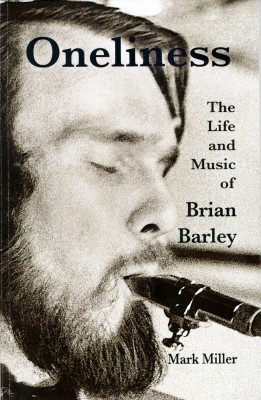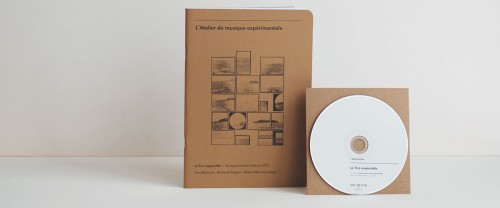![]() Mark Miller
Mark Miller
Oneliness The Life and Music of Brian Barley
Éric Normand
L’Atelier de musique expérimentale
(tour de bras)
 The late 1960s/early 1970s were a tumultuous time for various musical genres with new forms arising, often aligned with social and political foment. These recent works focus intensely on that period in Canada through the related lenses of jazz and improvised music. Mark Miller’s Oneliness: The Life and Music of Brian Barley is a biography of the forward-looking, Toronto-born jazz saxophonist, while L’Atelier de musique expérimentale, assembled by musician-producer Éric Normand, focuses on a performance space for Montreal’s experimental musicians. The works share a vital connection in artist/writer Raymond Gervais, Barley’s Montreal roommate and a founder of L’Atelier de musique expérimentale.
The late 1960s/early 1970s were a tumultuous time for various musical genres with new forms arising, often aligned with social and political foment. These recent works focus intensely on that period in Canada through the related lenses of jazz and improvised music. Mark Miller’s Oneliness: The Life and Music of Brian Barley is a biography of the forward-looking, Toronto-born jazz saxophonist, while L’Atelier de musique expérimentale, assembled by musician-producer Éric Normand, focuses on a performance space for Montreal’s experimental musicians. The works share a vital connection in artist/writer Raymond Gervais, Barley’s Montreal roommate and a founder of L’Atelier de musique expérimentale.
Miller is the essential chronicler of Canadian jazz, the focus of eight of his 13 books, including recent biographies of Claude Ranger and Sonny Greenwich. While those musicians made extended contributions, Brian Barley, who died in 1971 at age 28, was a tragic figure of immense promise. Oneliness (the term comes from the mystic G.I. Gurdjieff, an interest of some in Barley’s circle), is alive with the detail that distinguishes Miller’s writing. It’s an evocative tracing of Barley’s Toronto, from his Etobicoke childhood to Royal Conservatory and University of Toronto training to long-lost jazz venues like the First Floor Club, and his time spent in Vancouver and Montreal before his death in a Spadina Avenue rooming house. Barley, a gifted classical clarinet student, singled out for early praise, was increasingly preoccupied with the expressive possibilities of jazz. From membership in the National Youth Orchestra of Canada, Barley advanced to work with the Cleveland and Vancouver orchestras.
As he built jazz skills in Vancouver, a defining event occurred in his life. Driving to Seattle in May 1966 to hear the Bill Evans Trio, Barley crashed, suffering brain injuries. He spent weeks in hospital and was left with epilepsy and a dependency on medications that caused intense headaches and other symptoms, which he self-medicated with cannabis as he followed his jazz muse east to Montreal. There he met his most compatible musical partner, drummer Claude Ranger, with whom he recorded his enduring testament, The Brian Barley Trio, 1970.
Miller’s scrupulous account of Barley’s life is constructed out of the traces left by periodical reviews and the memories of fellow musicians. Miller first chronicled Barley in 1982, in a segment of Fourteen Lives: Jazz in Canada, and his research includes 40-year-old interviews, creating a portrait that would otherwise be impossible to assemble today. Oneliness has a tragic dimension: and Miller’s scrupulously gathered details develop a looming resonance issuing from the chasm that separates Barley’s promise from the accomplishment ultimately betrayed by that head injury.
 By contrast, the French language L’Atelier de musique expérimentale, which documents a short-lived collective performance space (AME), is virtually a playground, whether considered as a book accompanied by a CD or vice versa. It’s a sequence of distinct writings that range from reproduced typescripts to grey-scale copies of newspaper articles. Historian Eric Fillion and musician/producer Éric Normand have previously been responsible for chronicling Quebec’s radically politicized free jazz in both book and CD form, Fillion in his Jazz Libre et la révolution québécoise: Musique-action, 1967-1975 (M Éditeur: 2019), Normand in the four-disc Musique-Politique: Anthologie 1971-1974 by Le Quatuor de Jazz Libre du Québec (tourdebras.com). L’Atelier… has a scholarly account of the collective by Fillion, followed by illuminating typescripts by Raymond Gervais, including an omnibus account of the scene.
By contrast, the French language L’Atelier de musique expérimentale, which documents a short-lived collective performance space (AME), is virtually a playground, whether considered as a book accompanied by a CD or vice versa. It’s a sequence of distinct writings that range from reproduced typescripts to grey-scale copies of newspaper articles. Historian Eric Fillion and musician/producer Éric Normand have previously been responsible for chronicling Quebec’s radically politicized free jazz in both book and CD form, Fillion in his Jazz Libre et la révolution québécoise: Musique-action, 1967-1975 (M Éditeur: 2019), Normand in the four-disc Musique-Politique: Anthologie 1971-1974 by Le Quatuor de Jazz Libre du Québec (tourdebras.com). L’Atelier… has a scholarly account of the collective by Fillion, followed by illuminating typescripts by Raymond Gervais, including an omnibus account of the scene.
Barley sometimes seems limited by the scenes in which he works, while the Atelier is at the cutting edge of its era. The CD of previously unreleased improvisations by Le Trio Expansible (clarinetist Robert M. Lepage, guitarist Bernard Gagnon and bassist Yves Bouliane) presents unstructured interactions that are still slightly startling, often percussive and usually exploring unusual timbre, whether minimalist, pointillist or conversational. The close listening is such that similarities arise among the instrument’s sounds.
Oneliness concludes with Gervais’ 1986 audio-visual tribute to Barley, called “Oneliness”, with a soundtrack provided by a Gurdjieff piano piece; Atelier… includes a photo of Gervais, circa 1977, setting up an installation with four turntables.
Oneliness can be ordered at: https://volumesdirect.com/collections/music/products/oneliness-the-life-and-music-of-brian-barley.
L’Atelier de musique expérimentale can be ordered at www.tourdebras.com.
Stuart Broomer writes frequently on music (mostly improvised) and is the author of Time and Anthony Braxton. His column “Ezz-thetics” appears regularly at pointofdeparture.org.



